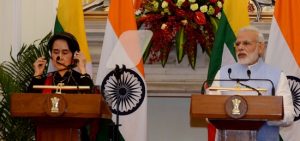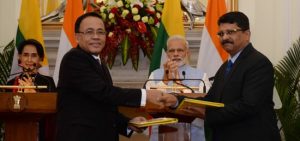 Signalling a fresh ballast to New Delhi’s Act policy, India and Myanmar, Southeast Asia’s emerging powerhouse, have decided to scale up their economic and strategic relations to a new level as the two countries signed three pacts in areas of power, banking and training. In a boost to New Delhi’s campaign to isolate Pakistan, Myanmar rallied in support of India and shared the assessment that “the fight against terrorism should target terrorists, hold to account terror organisations, networks and also states that encourage, support or finance terrorism in any way.”
Signalling a fresh ballast to New Delhi’s Act policy, India and Myanmar, Southeast Asia’s emerging powerhouse, have decided to scale up their economic and strategic relations to a new level as the two countries signed three pacts in areas of power, banking and training. In a boost to New Delhi’s campaign to isolate Pakistan, Myanmar rallied in support of India and shared the assessment that “the fight against terrorism should target terrorists, hold to account terror organisations, networks and also states that encourage, support or finance terrorism in any way.”
India’s Prime Minster, Narendra Modi and Myanmar’s State Counsellor Aung San Suu Kyi had wide range talks in New Delhi on October 19, three days after they met at the BIMSTEC Summit in Goa. Mr Modi was all praise for dynamism and leadership of the India-educated Suu Kyi, who is spearheading the transformation of Myanmar since the NDL came to power last year. Mr Modi conveyed India’s full support and solidarity in the emergence of Myanmar as a modern, secure, “economically “better-connected nation”.
Ms Suu Kyi’s links to India go back to the time when her father was ambassador to India and her education at Lady Shriram College in New Delhi.
Development Partnership
 The focus of the talks was on expanding development and economic partnership between the countries. Building on the visit of Myanmar’s president U Htin Kyaw to India in August, the two sides decided to fast-track the implementation of development and connectivity projects. “India expressed support for the efforts of the State Counsellor for the economic and social development of the country, especially in the creation of livelihood, capacity building, reconstruction of roads, provision of power, education facilities and health infrastructure that would contribute to progress and prosperity of the people of Myanmar,” said a joint statement after the talks.
The focus of the talks was on expanding development and economic partnership between the countries. Building on the visit of Myanmar’s president U Htin Kyaw to India in August, the two sides decided to fast-track the implementation of development and connectivity projects. “India expressed support for the efforts of the State Counsellor for the economic and social development of the country, especially in the creation of livelihood, capacity building, reconstruction of roads, provision of power, education facilities and health infrastructure that would contribute to progress and prosperity of the people of Myanmar,” said a joint statement after the talks.
Upscaling economic ties was a major focus area. The Myanmar side invited Indian companies to participate in competitive tenders for petrochemical and petroleum products, marketing infrastructure and the setting up of LPG terminals. The two sides decided to remove barriers to enhance trade and investment.
The signing of the power agreement cooperation is crucial as it will help scale up the power supply from Moreh in Manipur to Tamu in Myanmar. India also proposed to set up a pilot LED electrification project at a site designated by the Government of Myanmar.
Development cooperation is poised for a boost. With the increasing demand-supply gap of pulses in India, India offered its support in setting up a Varietal Development and Seed Production Centre on Pulses in Myanmar.
India has pledged $1.7 billion of development assistance to Myanmar. India’s development partnership with Myanmar encompasses mega connectivity projects like Kaladan and Trilateral Highway, to projects in the fields of human resource development, healthcare, training and capacity building.
The two countries also decided to fast-track key connectivity projects, including the ‘Kaladan’ Multi-Modal Transport Project in 2008 and the India-Myanmar-Thailand trilateral Highway. These projects could be a game-changer in connecting India’s northeast states to Southeast Asia and will promote development of the northeast region.
Common stance on terrorism
The talks saw a striking convergence of perspective on terrorism as they discussed plans to intensify security and counter-terror cooperation. The joint statement underscored that the fight against terrorism should target terrorists, hold to account terror organisations, networks and also states that encourage, support or finance terrorism in any way. The two sides “reaffirmed their shared commitment to fight insurgent activity and the scourge of terrorism in all its forms and manifestations,” said the joint statement. “Both sides expressed the view that the long-standing commitment not to allow insurgent groups to use their soil for hostile activities against the other side is essential for the prosperity of the people residing along the border.”
Maintaining security along the 1, 640-kilometre India-Myanmar border remains a challenge. Stressing that the security interests of India and Myanmar are closely aligned, Mr Modi focused on “a close coordination to ensure security in the areas along our border, and sensitivity to each other’s strategic interests.”
Author Profile
- India Writes Network (www.indiawrites.org) is an emerging think tank and a media-publishing company focused on international affairs & the India Story. Centre for Global India Insights is the research arm of India Writes Network. To subscribe to India and the World, write to editor@indiawrites.org. A venture of TGII Media Private Limited, a leading media, publishing and consultancy company, IWN has carved a niche for balanced and exhaustive reporting and analysis of international affairs. Eminent personalities, politicians, diplomats, authors, strategy gurus and news-makers have contributed to India Writes Network, as also “India and the World,” a magazine focused on global affairs.
Latest entries
 DiplomacyJanuary 5, 2026India walks diplomatic tightrope over US operation in Venezuela
DiplomacyJanuary 5, 2026India walks diplomatic tightrope over US operation in Venezuela India and the WorldNovember 26, 2025G20@20: Africa’s Moment – The Once and Future World Order
India and the WorldNovember 26, 2025G20@20: Africa’s Moment – The Once and Future World Order DiplomacyOctober 4, 2025UNGA Resolution 2758 Must Not Be Distorted, One-China Principle Brooks No Challenge
DiplomacyOctober 4, 2025UNGA Resolution 2758 Must Not Be Distorted, One-China Principle Brooks No Challenge India and the WorldJuly 26, 2025MPs, diplomats laud Operation Sindoor, call for national unity to combat Pakistan-sponsored terror
India and the WorldJuly 26, 2025MPs, diplomats laud Operation Sindoor, call for national unity to combat Pakistan-sponsored terror







